Daily Vocabulary Words: List of Daily Used Words
Hi there. Welcome to this special section @ Wordpandit.
Our endeavour here is straightforward: highlighting important daily vocabulary words, you would encounter in The Hindu. This is your repository of commonly used words; essentially, we are posting a list of daily used words. Hence, this has significant practical application as it teaches you words that are commonly used in a leading publication such as The Hindu.
Visit the website daily to learn words from The Hindu.
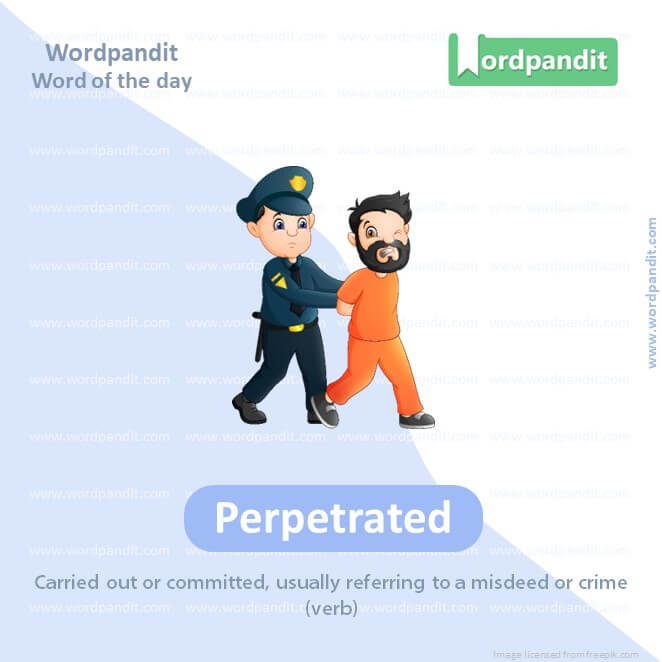
WORD-1: Perpetrated
CONTEXT: It is a gross injustice to all Palestinians to conflate them with terrorist acts perpetrated by Hamas — refusing to make a distinction between combatants and non-combatants only further marginalises the pain of all victims of violence.
SOURCE: The Hindu
EXPLANATORY PARAGRAPH: Imagine you’re playing with your toys, and your friend accidentally breaks one of them but blames it on you. That’s like something being “perpetrated.” It means to do something wrong or harmful, especially a crime or wrongdoing.
MEANING: Carried out or committed, usually referring to a misdeed or crime (verb).
PRONUNCIATION: PUR-puh-treyt-id
SYNONYMS: commit, enact, carry out, execute, perform
USAGE EXAMPLE:
1. The robbery was perpetrated by a group of masked individuals.
2. He was accused of perpetrating a series of cybercrimes.
3. The vandalism was perpetrated by mischievous teenagers.
4. The company was found guilty of perpetrating fraud against its customers.
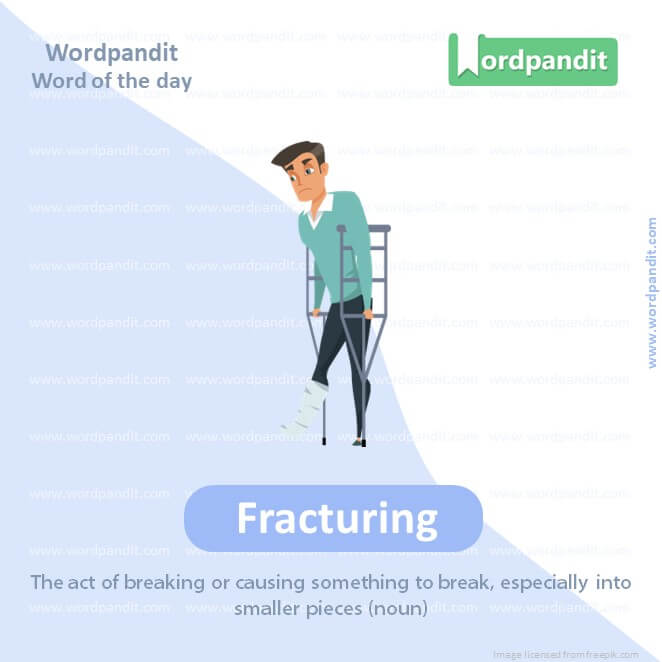
WORD-2: Fracturing
CONTEXT: At a time when the international order is fracturing, the U.S., as a global leader, must endeavour to build, not break consensus in order to favour one country.
SOURCE: The Hindu
EXPLANATORY PARAGRAPH: Imagine you have a piece of chocolate, and when you break it, it splits into two or more pieces. That’s like “fracturing.” It means breaking or causing something to break into smaller pieces.
MEANING: The act of breaking or causing something to break, especially into smaller pieces (noun).
PRONUNCIATION: FRAK-cher-ing
SYNONYMS: breaking, splitting, fragmenting, cracking, dividing
USAGE EXAMPLE:
1. The earthquake caused the fracturing of buildings and roads.
2. Fracturing the rock allowed access to the valuable minerals inside.
3. The fracturing of the coalition led to political instability.
4. The fracturing of the glass was due to extreme temperature changes.
WORD-3: Federated
CONTEXT: Parmar says, was partly a response to the histories of Adivasi communities coming under attack from the Rashtriya Swayamsevak Sangh (RSS)-affiliated Akhil Bharatiya Vanvasi Kalyan Ashram and its federated outfits for decades.
SOURCE: The Hindu
EXPLANATORY PARAGRAPH: Imagine you have a group of friends who all agree to play a game together and follow the same rules. That’s like being “federated.” It means to join or unite in a federation or alliance, often for a common purpose.
MEANING: Joined or united in a federation or alliance (adjective).
PRONUNCIATION: FED-uh-rey-tid
SYNONYMS: allied, unified, united, affiliated, associated
USAGE EXAMPLE:
1. The federated states worked together to address regional issues.
2. The clubs federated to organize a larger community event.
3. The federated companies collaborated on a joint marketing campaign.
4. The federated nations signed a treaty for mutual defense.
WORD-4: Appropriation
CONTEXT: The BAP has termed this act an appropriation of their identity.
SOURCE: The Hindu
EXPLANATORY PARAGRAPH: Imagine you have a bag of toys, and your sibling takes one of your toys without asking. That’s like “appropriation.” It means taking something, often without permission, and using it for oneself.
MEANING: The act of taking something for one’s own use, often without permission (noun).
PRONUNCIATION: uh-proh-pree-ey-shuhn
SYNONYMS: seizure, confiscation, taking, expropriation, usurpation
USAGE EXAMPLE:
1. The artist accused the gallery of appropriation of her style.
2. The appropriation of public funds led to a corruption scandal.
3. The government’s appropriation of land for development sparked protests.
4. Cultural appropriation is a sensitive topic in discussions about diversity.
WORD-5: Contradicting
CONTEXT: In addition to the date of the massacre contradicting scholarly work on the Bhil Revolt in the early 20th Century and the Mangarh massacre, the reason why Govind Guru ended up at the Mangarh fort was left out in this description.
SOURCE: The Hindu
EXPLANATORY PARAGRAPH: Imagine your friend tells you a story about their adventure, but then another friend says something that completely disagrees with the first story. That’s like “contradicting.” It means saying or doing something that goes against what has already been said or done.
MEANING: Denying or disagreeing with what has been said or done (verb).
PRONUNCIATION: kon-truh-dik-ting
SYNONYMS: opposing, challenging, denying, refuting, countering
USAGE EXAMPLE:
1. Her actions were contradicting her earlier statements.
2. The witness’s testimony contradicted the defendant’s alibi.
3. Contradicting scientific evidence led to further investigation.
4. His behavior was constantly contradicting his professed beliefs.
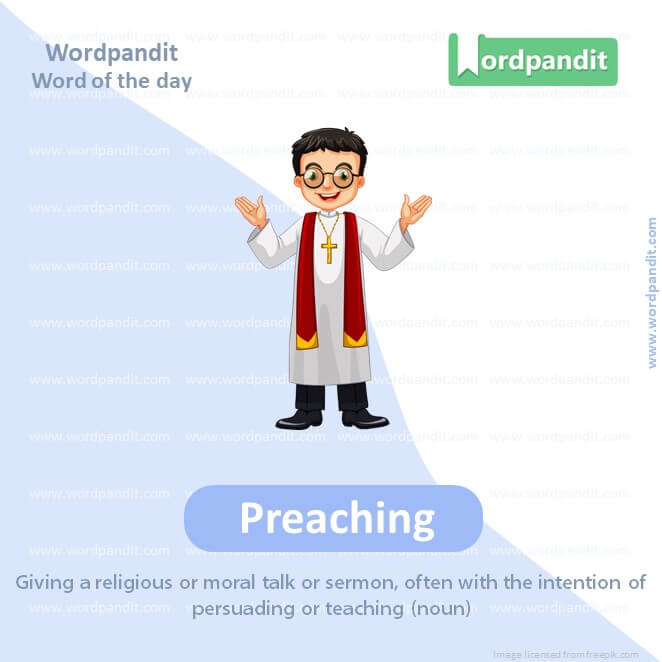
WORD-6: Preaching
CONTEXT: the Ruler of the Idar kingdom had, a month before the massacre, tried to arrest Govind Guru in a bid to subdue his rising influence among the Bhils of Banswara, Dungarpur, and Sunth States because of his preaching.
SOURCE: The Hindu
EXPLANATORY PARAGRAPH: Imagine you have a favorite story or lesson that you like to tell others because you believe it’s important. That’s like “preaching.” It means giving a speech or talking passionately about a belief, often with the intention of persuading others to follow it.
MEANING: Giving a religious or moral talk or sermon, often with the intention of persuading or teaching (noun).
PRONUNCIATION: PREE-ching
SYNONYMS: sermonizing, teaching, advocating, promoting, evangelizing
USAGE EXAMPLE:
1. His preaching about kindness inspired many to perform acts of charity.
2. The preacher’s Sunday preaching attracted a large congregation.
3. The politician’s constant preaching about unity resonated with voters.
4. Her preaching on environmental conservation led to positive changes in the community.
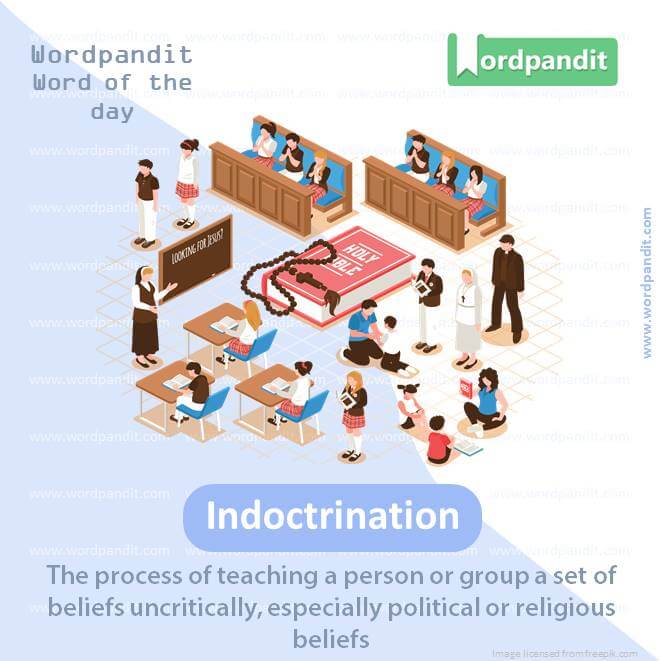
WORD-7: Indoctrination
CONTEXT: Every time delegates of the Vanvasi Kalyan Ashrams build networks in the remote tribal villages of Jharkhand, their campaigns to build Hindu temples are almost always accompanied with indoctrination, Tigga says.
SOURCE: The Hindu
EXPLANATORY PARAGRAPH: Imagine someone teaching you a set of rules or beliefs and saying that you must always follow them without question. That’s like “indoctrination.” It means teaching someone to accept a particular set of beliefs or ideas without questioning them.
MEANING: The process of teaching a person or group a set of
beliefs uncritically, especially political or religious beliefs.
PRONUNCIATION: in-dok-truh-NEY-shuhn
SYNONYMS: brainwashing, conditioning, teaching, instruction, inculcation
USAGE EXAMPLE:
1. The cult’s indoctrination methods were designed to control members’ thoughts.
2. Education should focus on critical thinking rather than indoctrination.
3. The government’s propaganda aimed at the indoctrination of young minds.
4. Parents should encourage open-mindedness and critical thinking to prevent indoctrination.
WORD-8: Assertions
CONTEXT: Writings and official Israeli assertions offer an idea of what ‘a Jewish national home’ and a long-standing dispute constitute.
SOURCE: The Hindu
EXPLANATORY PARAGRAPH: Imagine you have a strong opinion about something, and you keep saying it confidently even if others disagree. That’s like “assertions.” It means stating something confidently as if it’s true, even if it’s not proven or accepted by everyone.
MEANING: Confidently stating something as true, often without providing proof or evidence (noun).
PRONUNCIATION: uh-sur-shuhns
SYNONYMS: declarations, claims, affirmations, proclamations, statements
USAGE EXAMPLE:
1. Her assertions about the benefits of exercise were supported by scientific research.
2. He made bold assertions about the future of technology.
3. The candidate’s assertions during the debate were challenged by opponents.
4. The book is filled with historical assertions that have sparked debate among scholars.
WORD-9: Succinctly
CONTEXT: Rarely has social media summed up a situation so succinctly. According to the Urban Dictionary, the noun Israel ‘got israeled’ as a verb to mean when someone is asked to share something of yours, then claims it as their own, and takes it for themselves.
SOURCE: The Hindu
EXPLANATORY PARAGRAPH: Imagine you have a lot of things to say, but you manage to express them in just a few words, making your point clear and easy to understand. That’s like saying something “succinctly.” It means expressing something briefly and clearly, without unnecessary details.
MEANING: In a brief and concise manner, without unnecessary details (adverb).
PRONUNCIATION: suhk-SINGKT-lee
SYNONYMS: briefly, concisely, tersely, shortly, compactly
USAGE EXAMPLE:
1. He explained the complex concept succinctly, making it easy for everyone to understand.
2. The summary of the report was presented succinctly at the meeting.
3. She answered the question succinctly, leaving no room for confusion.
4. The author’s writing style is known for its ability to convey ideas succinctly.
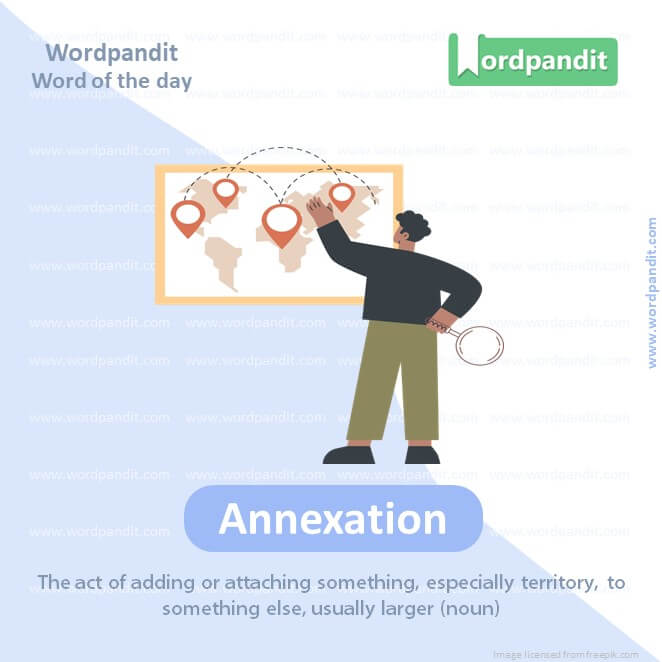
WORD-10: Annexation
CONTEXT: On the contrary, and early in 2018, Israel’s ruling Likud Party unanimously endorsed a resolution calling for the annexation of West Bank settlements.
SOURCE: The Hindu
EXPLANATORY PARAGRAPH: Imagine you have a big room, and you decide to add another small room next to it, making the whole space bigger. That’s like “annexation.” It means adding or attaching something, usually territory or property, to something larger.
MEANING: The act of adding or attaching something, especially territory, to something else, usually larger (noun).
PRONUNCIATION: uh-NEK-shey-shuhn
SYNONYMS: incorporation, attachment, addition, integration, joining
USAGE EXAMPLE:
1. The annexation of the neighboring town doubled the city’s size.
2. The annexation of new territories expanded the empire’s influence.
3. The company announced the annexation of a smaller firm to strengthen its market position.
4. The treaty included clauses about the annexation of disputed lands.
Vocabulary Words
When delving into the dynamic world of languages, the grandeur of ‘vocabulary words’ is all-encompassing. The importance of ‘vocabulary words’ in effective communication cannot be overstated; it’s these words that form the backdrop of any language, painting intricate pictures of thoughts and ideas.
Starting on the journey of learning ‘vocabulary words’, one should steer clear from rote memorization. The traditional structure of merely repeating words lacks the necessary context and application that actually embeds these words into your memory. To truly master the ‘vocabulary words’, one needs an integrated, immersive approach.
The first step towards mastering ‘vocabulary words’ is to engage with varied language mediums. Expanding beyond textbooks to read fiction, articles, blogs, and other forms of content not only diversifies your vocabulary but also acts as a mirror to reflect the practical application of these words. Essentially, you’re exposed to the words as they are commonly used, allowing you to truly understand their essence.
Empowering this journey, tech tools like language learning apps and memory-enhancing flashcards significantly aid in learning ‘vocabulary words’. These interactive tools provide a more engaging learning experience and hone word retention. Mnemonic devices, associating words with a unique story or visual image, enrich the process and make memory recall more efficient.
Practicing ‘vocabulary words’ by using them in day-to-day conversations exemplifies learning by doing. It also strengthens the neural pathways and improves overall word recall. This, coupled with regular revisions, ensures your grasp over ‘vocabulary words’ remains strong.
In conclusion, learning ‘vocabulary words’ is not just about adding words to your linguistic cupboard, but understanding their essence and utilizing them effectively. An inclusive approach to learning that combines diverse reading materials, technology tools, mnemonic devices and practice can really propel your mastery over ‘vocabulary words’. Remember, language is the bloodline of communication, and ‘vocabulary words’ are its heartbeat. ‘










